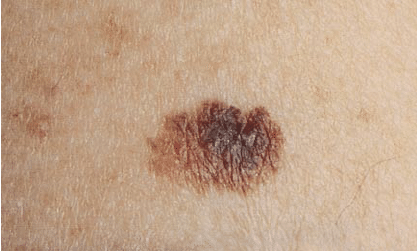This is an extremely important topic because a mole with patchy dark areas can be alarming and signify underlying health issues, such as skin cancer. Skin cancer is a dangerous disease, and early discovery is critical for successful treatment. Understanding when to seek medical attention and what indications to look for can save lives.
As a result, it’s critical to be well-informed on the risks linked with unusual moles.
By the end of this essay, you will have a better awareness of what to look for, how to track changes in your moles, and the necessity of obtaining medical attention when necessary. This knowledge can help you take proactive efforts to improve your skin health and alleviate any concerns you may have about atypical moles.
The ABCDEs of Moles
To determine whether a mole with patchy dark spots is concerning, you can use the ABCDE method, which stands for Asymmetry, Border, Color, Diameter, and Evolving. Here’s how to evaluate each characteristic:
1. Asymmetry
One half of the mole does not match the other half.
2. Border
The edges of the mole are irregular, ragged, or blurred.
3. Color
The mole has multiple colors or an uneven distribution of colors.
4. Diameter
The mole is larger than 6 millimeters (about the size of a pencil eraser), although melanomas can be smaller.
5. Evolving
The mole is changing in size, shape, or color.
When to See a Doctor
It’s essential to consult a dermatologist if you notice any of the following:
1. The mole is itching, tender, or painful.
2. The mole is oozing, bleeding, or becoming crusty.
3. New moles are appearing after the age of 20.
4. The mole looks significantly different from your other moles.
Preventative Measures and Monitoring
To stay on top of your skin health, consider the following recommendations:
1. Perform monthly self-examinations to monitor any changes in your moles.
2. Schedule annual check-ups with a dermatologist for professional skin examinations.
3. Practice sun safety by using sunscreen, wearing protective clothing, and avoiding peak sun hours.
4. Keep a photographic record of your moles to spot any changes over time.
In summary, while a mole with patchy dark spots can be concerning, understanding how to evaluate moles using the ABCDE method, knowing when to consult a doctor, and taking proactive steps to monitor and protect your skin can make a significant difference in early detection and treatment of potential skin conditions. Stay vigilant and prioritize your skin health.
